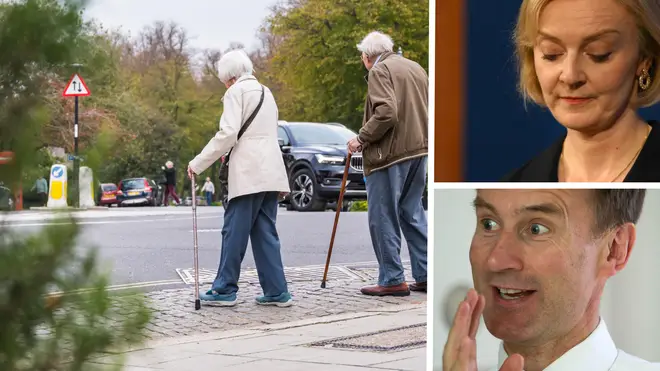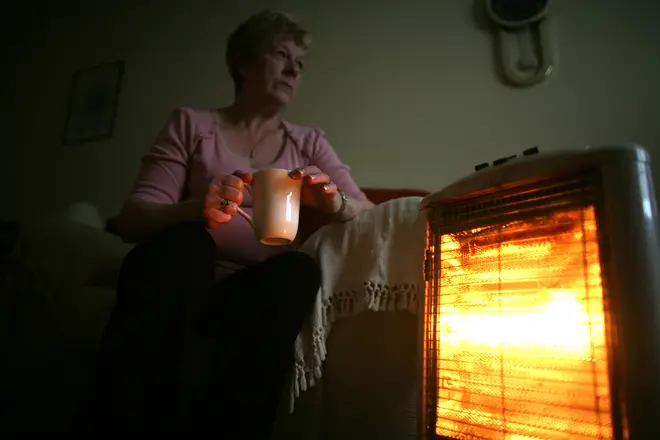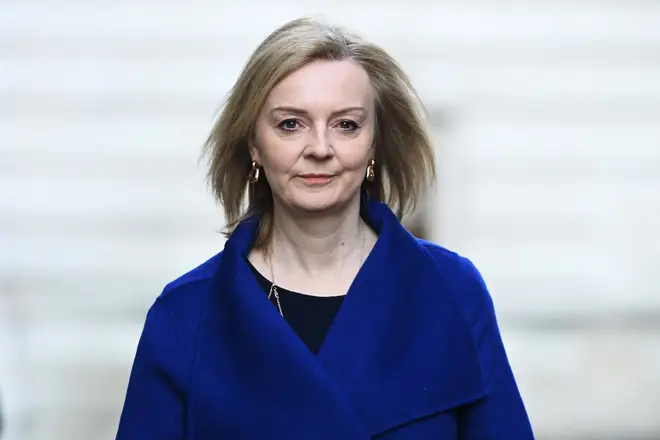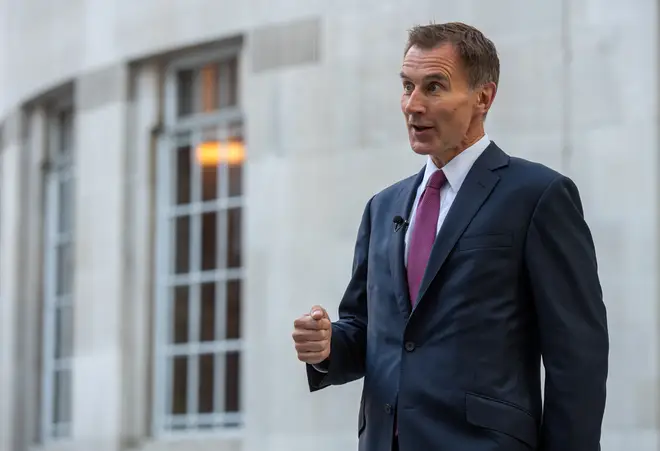
Clive Bull 1am - 4am
18 October 2022, 21:58 | Updated: 19 October 2022, 09:48

Prime Minister Liz Truss has refused to commit to keeping the pension triple lock, meaning that millions of OAPs who were set to see their incomes rise by 10% this winter could now miss out - with Conservative MPs warning the party's poll ratings "could literally go through the floor" as a result.
The Prime Minister's official spokesman did not commit to maintaining the triple lock on Tuesday, which has been a cornerstone of Conservative policy since 2010, and was in the Tory manifesto in 2019.
Under the triple lock, the state pension rises each year in line with inflation, average earnings growth, or 2.5% - whichever is higher. With the September inflation rate set to reach a staggering 10% when it is announced tomorrow, millions would have been set for a big increase in their income next year.
But with the government committing to cutting spending under new chancellor Jeremy Hunt, and under pressure from financial markets, the triple lock could now be scrapped.

The Prime Minister's official spokesman said on Tuesday: "We are very aware of how many vulnerable pensioners there are and indeed our priority ahead of this fiscal plan is we continue to protect the most vulnerable in society.
"The Prime Minister and the Chancellor are not making any commitments on individual policy areas at this point, but as I say the decisions will be made through the prism of what matters most to the most vulnerable."
Ms Truss herself said she was not making any commitments, when asked about the future of the triple lock.

Business Sec: Pension funds almost went bust due to risky investments
Mr Hunt, who was appointed on Friday after previous chancellor Kwasi Kwarteng was sacked just five weeks into the job amid economic turmoil, announced on Monday that the government would be rowing back on £32 billion in tax cuts promised by Ms Truss and his predecessor.
He added that the government would also have to make "eye-watering" spending cuts in a bid to restore the public finances and quell instability.
Read more: Liz Truss is 'worse than useless', says former Tory minister Edwina Currie
Asked whether the refusal to commit to the pensions triple lock came from Ms Truss or Mr Hunt, the PM's official spokesman told reporters: "A mutual decision. Obviously the Prime Minister and Chancellor had a number of discussions ahead of the statement yesterday, including over the weekend.
"And their agreed position is to prioritise economic stability and to not making any commitments on individual policy areas at this point and wait until the 31st (of October) to come forward."

Liz Truss pushed on why pensions will rise but benefits will not
Pressed on whether Ms Truss felt like she had been pushed into it by Mr Hunt, the spokesman said: "No".
Scrapping the pensions triple lock would effectively mean a real-terms cut to the income of pensioners - often a core constituency for the Conservatives, who are under major electoral pressure.
Several Tory MPs said on Tuesday evening that they would rebel against a decision to get rid of the protection for pensioners.
Nigel Mills, the chairman of the all-party group on pensions, told the Mail: "The idea that people on a fixed income would not get an increase in line with inflation is preposterous."
"It’s not like they can go back to work after being retired for 20 years to earn the shortfall. I hope someone gets a grip on this pretty quickly and this is just a mis-speak because it’s ridiculous.
"Our poll ratings are already nearly through the floor, but they’ll literally go through the floor at this rate."
Maria Caulfield, who represents Lewes in Sussex tweeted: "I will not be voting to end the pensions triple lock.
"Pensioners should not be paying the price for the cost-of-living crisis whether caused by the war in Ukraine or mini budgets."
Steve Double, MP for St Austell and Newquay in Cornwall, agreed, tweeting: "Nor me".
Stephen Crabb, the MP for Preseli Pembrokeshire in Wales, told the Telegraph: "This is not the time to consider abandoning the triple lock, especially after such clear promises were made following the last temporary pause.
"Maintaining the value of the state pension during the cost-of-living crisis is essential."
Meanwhile the head of Age UK, a charity that supports pensioners, said scrapping the triple lock would be "a huge blow" to elderly people.
Caroline Abrahams said: "If she reneges on it now it will be a betrayal of our older population, and hurt those on low and modest incomes the most. Let’s be clear, anything less than the triple lock would mean a real terms cut in the state pension, which is only worth on average about £9,000 anyway, yet comprises the bulk of the income of most older people.
"Many older people are already deeply apprehensive about how they will get through the winter as prices continue to soar, so any decision to break the triple lock promise would be a huge blow."

Although the pensions triple lock has come under scrutiny, Mr Hunt said that no department would be exempt from consideration for spending cuts.
Downing Street did not rule out the Department of Health and Social Care having to find savings, although defence will not be affected.
The Prime Minister's official spokesman said: "On health, I can only point you to what the Chancellor has said on this on a number of occasions.
"There was a lengthy discussion in Cabinet on preparations for the medium-term fiscal plan and what that would entail, I'm not going to be getting into discussion as to who said what."

But the government insisted it will stand by a promise of increasing defence spending to 3% of GDP by 2030 but suggested the "shape" of how the funding gets there could change.
The Prime Minister's official spokesman said: "You've heard from the Chancellor on this. We are obviously committed to maintaining the UK's position at the forefront of Nato, that's why the PM committed to raise defence spending to 3% of GDP by 2030.
"The shape of that increase will be set out at future spending reviews in the normal way."